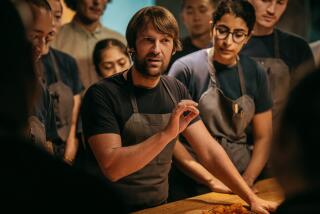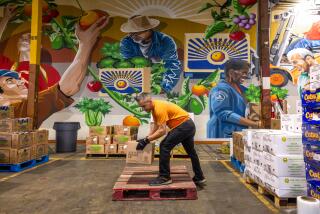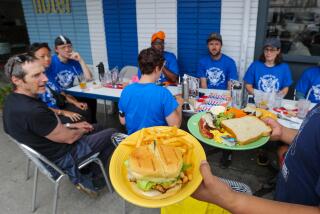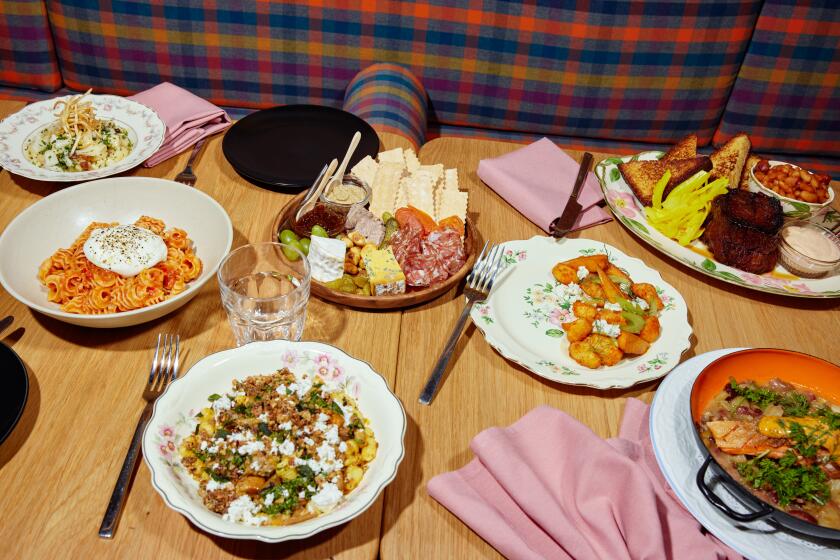L.A. school district doesn’t bite at ‘Food Revolution’ chef’s offer
- Share via
Jamie Oliver, the English chef who took on the “lunch ladies” of Huntington, W.Va., in an attempt to make school food more healthful, has been told thanks but no thanks by the Los Angeles Unified School District.
“Our feeling was that his time would be better spent or invested in other communities,” Melissa Infusino, the director of partnerships in the superintendent’s office, said Friday.
Oliver is bringing his “Food Revolution” reality television show to L.A. for its second season, and he and his family plan to move to the area in January, a spokeswoman said. ABC posted a casting notice on its website: “We’re searching for families with children who could use Jamie’s help in the kitchen to overcome the obstacles to healthy eating.”
But just what the show will focus on remains undecided.
“We are not prepared to comment about the show because it’s still in the creative stages,” said Amber Gereghty, an ABC publicity director. She said there would be an element involving schools.
L.A. Unified has written the supervising producer of the show, Joe Coleman, thanking him for “reaching out.”
“While we appreciate your interest in our school meal program, we believe our direct work with nutrition experts, health advocates, the community, schools and students is the most effective strategy for our continued success and improvement,” said the letter, signed by Infusino.
The Oct. 25 letter also said that taking part in the show could be too time-consuming.
The district has already been forced to shorten the school year and require roughly 40 furlough days a year, she noted. “Due to these budgetary challenges, participation in the ‘Food Revolution’ program would prevent us from committing 100% of our efforts to our students,” the letter said.
Infusino said Friday that she had talked with Coleman about other ways “Food Revolution” might be helpful, including working in neighborhoods on such issues as food “deserts”: places with little access to affordable fresh produce and other healthful groceries
Infusino wrote Coleman that his efforts “are in perfect alignment” with the mission of L.A. Unified’s food service program to promote health and healthful food. She cited the school board’s 2004 ban of soda sales in schools and its votes to ban the sale of junk food and reform the nutritional value of meals.
Oliver has railed against flavored milk and says schools should serve less processed food and more that’s cooked from scratch. But some authorities say that if schools don’t offer chocolate milk, children will miss out on the nutrients in milk. And processed food often is cheaper than fresh.
Megan Hanson, an advocate for improvements in school food, said campuses should welcome Oliver.
“I think it would be a good thing if they loosened up and let some light in. They just keep resisting what seems to be inevitable change,” said Hanson, executive director of RootDown LA, which works with South L.A. high school students to improve nutrition.
Oliver’s efforts to improve the school lunch in West Virginia proved to be popular television, as he encountered resistance from cafeteria staff and talked to children who couldn’t identify common fruits and vegetables. To make his points, the British chef with the just-out-of-bed hairstyle went so far as to dress up as a pea pod and run around the school grounds. He seemed to have made some progress by the end of his stay.
Rhonda McCoy, Cabell County school district food services director, didn’t return phone calls seeking comment. When the district called West Virginia to discuss the experience, people replied with “no comment,” Infusino said.
More to Read
Eat your way across L.A.
Get our weekly Tasting Notes newsletter for reviews, news and more.
You may occasionally receive promotional content from the Los Angeles Times.











